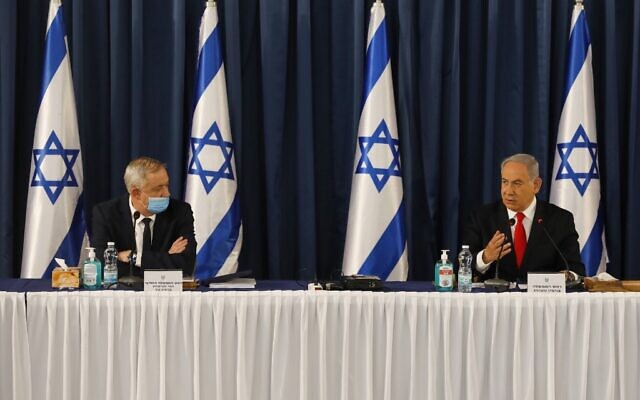Move comes after sides refuse to agree on agenda for weekly summit, marking new low for crumbling coalition as parties remain split over budget

Israel’s ruling coalition appeared to slide closer to dissolution Saturday night as both the Likud and Blue and White factions announced that there would be no cabinet meeting Sunday, casting blame on each other for the impasse.
The extraordinary announcement brought a growing coalition crisis into sharp relief, as both parties appeared to dig in their heels amid rampant speculation that fresh elections could be around the corner over an intensifying budget brawl .
Under their coalition deal, both parties must okay the agenda for the weekly cabinet meeting, generally held on Sundays. But with no agreed-upon agenda, the meeting was called off.
In a statement, Likud accused Blue and White of refusing to okay an agenda item on a proposal for a NIS 8.5 billion ($2.5 billion) coronavirus assistance program.
“The cabinet meeting will not convene tomorrow due to Blue and White’s refusals to put on the agenda a government economic assistance plan, by the prime minister and finance minister” the party said.
“The plan will create around 10,000 new jobs in the economy,” it added. “Likud demands from Blue and White to not prevent the transfer of funds to the citizens of Israel at this time, when it is coping with the coronavirus crisis.”

Blue and White responded by charging that the meeting was called off “due to Likud’s insistence on not adhering to the coalition agreement.”
“This is not the first time Likud has not stood by its commitments, and every other excuse is a complete lie to the Israeli public,” it said.
It described the proposal of the assistance plan as a smokescreen, saying it had not yet been finalized.
The main bone of contention between the parties has been a dispute over the budget, sparking feverish speculation that Israel could be headed to its fourth election in under two years.
The government has until August 25 to approve a budget or it will automatically dissolve. Netanyahu and Gantz agreed to pass a budget through 2021 as part of the coalition deal between their parties, but the premier is calling for a budget that only covers the rest of 2020, citing the uncertainty caused by the coronavirus pandemic. Gantz on the other hand is insisting on a budget that runs through next year.
In an interview aired Saturday, Gantz stuck to his guns, saying he would not drop his demand for a budget that runs through 2021.
“To stabilize the government, a plan is needed for 2020-2021. Not a budget for the holidays or [for a] weekend, a budget for a full year,” he told Channel 12 news. “I won’t concede.”

Gantz and Netanyahu agreed on a power-sharing deal in May after three consecutive rounds of elections proved indecisive. The deal split Blue and White, due to the party’s campaign pledge not to join a government led by the premier because of the graft charges against him.
While Netanyahu has to hand over the premiership to Gantz if he calls new elections before the Blue and White chief takes over as prime minister in November 2021, the coalition deal made an exception for a failure to pass a budget, leading to speculation the Likud leader was forcing the budget crisis to avoid having to leave office.
According to a Channel 12 news report Tuesday, Netanyahu is offering to funnel hundreds of millions of shekels to yeshivas outside of the budget framework to reduce opposition by the ultra-Orthodox Shas and United Torah Judaism parties to breaking up the government and calling elections.

The network said that ultra-Orthodox objections to elections are based on concerns that it would further delay the budget — and with it money for the yeshivas.
Both Shas and UTJ backed Netanyahu for prime minister through the elections over the past year, but have threatened to ditch their alliance with the premier if disagreements over the budget lead to new elections, the Kan public broadcaster reported Tuesday.
As reported by The Times of Israel
